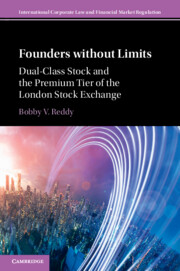Book contents
- Founders without Limits
- Cambridge University Press
- Founders without Limits
- Copyright page
- Contents
- Figures
- Tables
- Preface
- Acknowledgements
- Table of Cases
- Table of Legislation and Regulation
- Abbreviations
- Introduction
- Part I Putting Dual-Class Stock into Context
- Part II Evaluating Dual-Class Stock
- Part III Formulating a Policy on Dual-Class Stock
- 8 The Existing Constraints
- 9 A Balanced Protection Package for Inferior-Voting Shareholders
- Epilogue
- Appendix Comparison of Inferior-Voting Shareholder Protections on Major Dual-Class Stock Exchanges
- Index
Epilogue
from Part III - Formulating a Policy on Dual-Class Stock
Published online by Cambridge University Press: 29 October 2021
- Founders without Limits
- Cambridge University Press
- Founders without Limits
- Copyright page
- Contents
- Figures
- Tables
- Preface
- Acknowledgements
- Table of Cases
- Table of Legislation and Regulation
- Abbreviations
- Introduction
- Part I Putting Dual-Class Stock into Context
- Part II Evaluating Dual-Class Stock
- Part III Formulating a Policy on Dual-Class Stock
- 8 The Existing Constraints
- 9 A Balanced Protection Package for Inferior-Voting Shareholders
- Epilogue
- Appendix Comparison of Inferior-Voting Shareholder Protections on Major Dual-Class Stock Exchanges
- Index
Summary
In contrast to the United States and, to a lesser extent, China, the United Kingdom’s listed company tech market is threadbare, notwithstanding the pipeline of growing, successful private companies.As part of a package to support entrepreneurs and innovation, relaxing the premium tier prohibition of dual-class stock could attract flotations on the London Stock Exchange by enabling founders to divest of equity and generate finance for growth while retaining the control essential to them in pursuing their long-term visions.Although regulators, and institutional investors, fear that dual-class stock incentivises public shareholder expropriation by controllers, evidence from other jurisdictions, especially the United States, does not corroborate those fears, and many exchanges, such as Hong Kong, Singapore, Tokyo, Shanghai and India have recently determined that the benefits of dual-class stock outweigh the costs.However, evidence also suggests that existing dual-class firms are excessively discounted by the market, and the United Kingdom could, therefore, accrue a commercial advantage by reducing the cost of capital for dual-class firms through the judicious use of constraints.By tailoring those constraints carefully as proposed in this book, ‘founder without limits’ will not be feared, but will be seen as a critical piece of the jigsaw in boosting the British economy in uncertain times.
Keywords
- Type
- Chapter
- Information
- Founders without LimitsDual-Class Stock and the Premium Tier of the London Stock Exchange, pp. 417 - 421Publisher: Cambridge University PressPrint publication year: 2021

